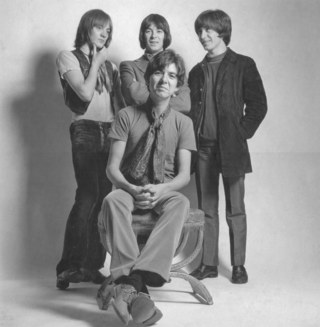
The Small Faces were an English rock band from London, founded in 1965. The group originally consisted of Steve Marriott, Ronnie Lane, Kenney Jones and Jimmy Winston, with Ian McLagan replacing Winston as the band's keyboardist in 1966. The band were one of the most acclaimed and influential mod groups of the 1960s, recording hit songs such as "Itchycoo Park", "Lazy Sunday", "All or Nothing" and "Tin Soldier", as well as their concept album Ogdens' Nut Gone Flake. They evolved into one of the UK's most successful psychedelic bands until 1969.

Stephen Peter Marriott, known professionally as Steve Marriott, was an English musician, guitarist, singer and songwriter. He co-founded and played in the rock bands Small Faces and Humble Pie, in a career spanning over 20 years. Marriott was inducted posthumously into the Rock and Roll Hall of Fame in 2012 as a member of Small Faces.
James Watson is an American biologist and chemist, the co-discoverer of the double-helical structure of DNA, awarded the 1962 Nobel Prize in Physiology or Medicine.
James, Jim, or Jimmy Martin may refer to:
In the United Kingdom, the Judge Advocate General is a judge responsible for the Court Martial process within the Royal Navy, British Army and Royal Air Force. As such the post has existed since 2006; prior to this date the Judge Advocate General's authority related to the Army and the RAF while the Judge Advocate of the Fleet was the equivalent with regard to the Royal Navy.
James or Jim Elliot(t) may refer to:
James or Jimmy Murphy may refer to:
James or Jim Gordon may refer to:

Humble Pie are an English rock band formed by singer-guitarists Peter Frampton and Steve Marriott in Moreton, Essex, in 1969. Often regarded as one of the first supergroups in music, Humble Pie experienced moderate popularity and commercial success during the 1970s with hit songs such as "Black Coffee", "30 Days in the Hole", "I Don't Need No Doctor", "Hot 'n' Nasty" and "Natural Born Bugie" among others.
James Morris may refer to:
Daniel, Danny or Dan Wilson may refer to:
James or Jim Gardner may refer to:
James or Jim Shaw may refer to:
Cannon is a surname of Gaelic origin: in Ireland, specifically Tir Chonaill (Donegal). It is also a Manx surname, where it arose from the Goidelic "Mac Canann" meaning "son of a whelp or wolf", related to the Anglo-Irish "Mac Connon", "Connon" and similar names.
You Are Here may refer to:
Sir James Marriott was a prominent British judge, politician and scholar of the late eighteenth century who is best known for his service as Judge of the High Court of Admiralty, the highest court in Britain dealing with naval and maritime affairs. Although he presided over a number of important naval cases, his contribution to legal history lies principally in the publication of Formulare instrumentarum, a text on admiralty law that had a significant influence on American law in particular. For the rest of his career, Marriott was a shameless pursuer of political favour, siding with several factions both before and during his service as Member of Parliament for Sudbury between 1780 and 1784 and 1796 and 1802. He was less successful in other areas of his life: he served as a Fellow and subsequently Master at Trinity Hall, Cambridge, but quarrelled with his colleagues and rarely attended the college. He also produced a number of legal pamphlets and poems, which his biography in the Oxford Dictionary of National Biography describes as "slender literary accomplishments".

Edgar is a commonly used English given name, from an Anglo-Saxon name Edgar . Like most Anglo-Saxon names, it fell out of use by the later medieval period; it was, however, revived in the 18th century, and was popularised by its use for a character in Sir Walter Scott's The Bride of Lammermoor (1819). The name was more common in the United States than elsewhere in the Anglosphere during the 1800s. It has been a particularly fashionable name in Latin American countries since the 20th century.
Marriott is an English surname, originally Huguenot and most frequently seen as a surname in East Anglia. Notable people with the surname include:
This page is based on this
Wikipedia article Text is available under the
CC BY-SA 4.0 license; additional terms may apply.
Images, videos and audio are available under their respective licenses.



